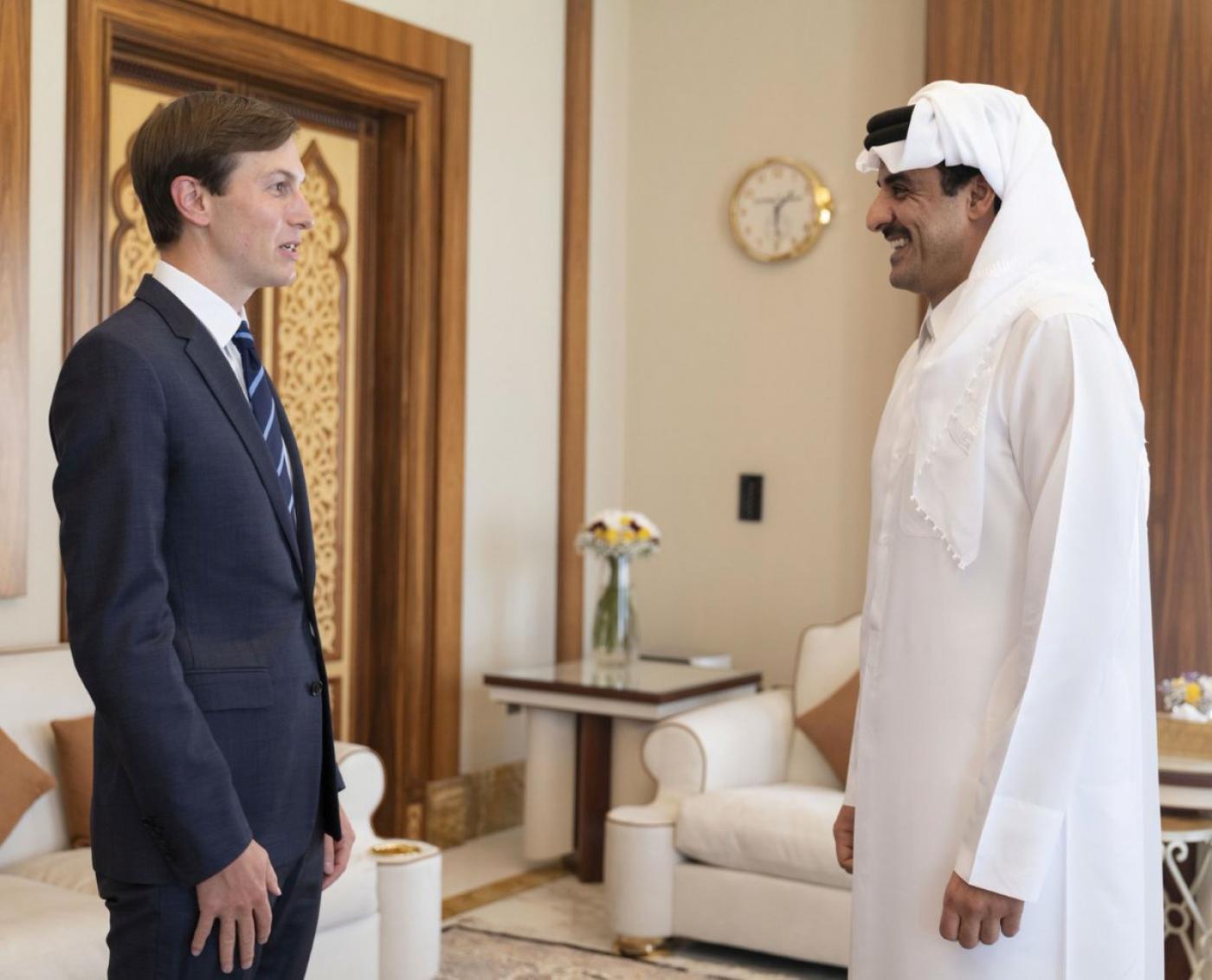While the former US president was a vocal supporter of the blockade on Qatar, he was quick to change his stance months into the regional crisis.
Saudi Crown Prince Mohammed bin Salman (MbS) asked former White House Advisor Jared Kushner to reconcile him with Qatar’s Amir Sheikh Tamim bin Hamad Al Thani during the 2017 GCC crisis.
This was revealed by Jared Kushner in his newly-released book ”Breaking History: A White House Memoir”, with excerpts tweeted by Al Araby journalist Zaid Benjamin.
The book reveals details of the moments leading up to the signing of the Al-Ula Declaration in January last year, ending the 2017 GCC crisis.
In the book, Kushner claimed he did not hesitate to proceed with the de-facto Saudi ruler’s request and went ahead with communicating with the Qatari leader to facilitate a phone call between Sheikh Tamim and the Saudi prince.
“I called the Saudi crown prince from a conference room at the amir’s palace in Doha and he assured me that he was sincere in his quest for reconciliation and that he was ready to make concessions,” said Kushner in his book, as quoted in Benjamin’s tweet.
“MbS liked the emir of Qatar personally and wanted to end the dispute”, Kushner stated in his book.
The former US official also noted a willingness for dialogue between Qatar’s Foreign Minister Sheikh Mohammed bin Abdulrahman Al Thani and Saudi Arabia Defence Minister Prince Khalid Al Saud.
Qatar’s amir told Kushner that he was open to resume talks with Saudi Arabia while expressing “his sadness at the dispute that led to a lot of bitterness between the Qatari and Saudi peoples.”
The four-year GCC crisis was triggered when Saudi Arabia, the United Arab Emirates, Bahrain, and Egypt imposed an illegal land, air and sea blockade on Qatar over claims that it supports terrorism.
Qatar has vehemently rejected those claims as baseless.
Reports at the time had revealed how the former US Donald Trump administration had encouraged the blockade, which was announced shortly after his visit to Saudi Arabia in 2017.
Days before the Al-Ula Summit that saw the signing of the historic accord, Kushner, also Trump’s son in-law, made various visits across the GCC region. While the move was seen as part of the former US administration’s efforts to rack up pre-election wins against rival Joe Biden, it did lead to the end of the crisis.
Two days before Al-Ula
According to Kushner, the Al-Ula Declaration was on the brink of collapse days ahead of the summit in Saudi Arabia.
Prince Khalid and his team did not inform MbS that Amir Tamim asked for the reopening of the airspace before the summit on 3 January, two days before the meeting.
Prince Khalid then informed MbS that Qatar requested renegotiation after the issues were settled, which Kushner said led to the collapse of the deal between the two countries at the time.
“I told [Sheikh] Mohammed bin Abdulrahman that Amir Tamim should come to the Al-Ula summit and promised him to settle everything there and that he would be treated with the highest levels of respect, despite the collapse of the agreement,” said Kushner.
He then told Sheikh Tamim that MbS agreed to open the airspace. The decision, which was unveiled to the world the night before the summit, was followed with a phone call between Amir Tamim and MbS three hours later.
During the phone call, Sheikh Tamim thanked MBS “for his flexibility” and confirmed his attendance at the summit.
Kushner claimed that before the historic moment of the amir’s arrival to Saudi Arabia, where he was embraced by MbS, Qatar’s foreign minister called him to say they were heading back to Doha as there was a last-minute change in the declaration.
“So I ran with the Kuwaiti foreign minister to MbS, who took the phone from us and went far then returned and said ‘the issue has been resolved’, adding ‘he gave a word’,” he said, as quoted by Benjamin.
Former US administration
Despite the former US president’s support for the blockade on Qatar, former Secretary of Treasury Steven Mnuchin told Doha News in June that the administration was surprised by the embargo.
“I don’t think it’s fair to characterise that the US was in favour of the blockade[…]the administration worked very closely behind the scenes,” Mnuchin told Doha News on the sidelines of the 2022 Qatar Economic Forum (QEF) in the Gulf state.
Following his pre-blockade visit to Saudi Arabia, Trump referenced Qatar in a tweet about extremism.
“During my recent trip to the Middle East I stated that there can no longer be funding of Radical Ideology. Leaders pointed to Qatar – look!,” tweeted the former US President in 2017.
“The nation of Qatar, unfortunately, has historically been a funder of terrorism at a very high level,” Trump told a White House press conference in 2017.
Various investigations have highlighted the support of the Trump administration for the blockade against Qatar, with several key Trump allies found to be involved in lobbying on behalf of some members of the quartet.
While Trump encouraged the blockade as it happened, then-US Secretary of State Rex Tillerson urged the blockading countries to ease the embargo on Doha, highlighting a clear split within the administration.
Tillerson’s stance against the blockade led him to becoming a target for prominent Trump fundraiser Elliott Broidy, who was lobbying on behalf of the UAE.
He was then dismissed that same year and was replaced with Mike Pompeo.
Despite the shockwaves that came with the regional crisis, Qatar has proven to be a reliable US ally, especially with the emergence of the new Joe Biden administration.
“I think Qatar has been a very important partner, working with the US on a lot of issues including energy. I think the good news is that Qatar has an expansion plan for the gas fields and that there will be more gas that comes online,” said Mnuchin.







